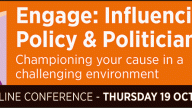Last month, RSPB released an apology for directly calling members of parliament ‘liars’ over social media, causing a backlash from the right-wing media and their own trustee. This slipup illustrated the difficulties and risks in social media and highlighted the need for more clarity.
Fortunately, just a few weeks later the Charity Commission released their new guidance on navigating social media. This new guidance significantly improves on an earlier release of the guidelines formulated in the draft consultation process earlier this year. This predecessor was criticised for lacking detail and was not well received by sector commentators, especially regarding its content on monitoring the social media accounts of individuals. Nevertheless, receiving almost 500 responses, this particular consultation proved just how well the Commission can work with the sector to gain valuable insights and produce something that is of worth to both trustees and charity staff.
Upon review, they have clearly taken into consideration feedback, and have been open and clear as to why they have made the changes they have. The guidance is now filled with much more extensive information, including resources such as checklists and examples of social media policies, as well as clearer messaging surrounding charity campaigning and when to monitor personal accounts. This is all great to see, particularly because it’s something DSC asked for when feeding back to the Commission.
Here are some of the things charity trustees and staff should be aware of from the new guidance:
A social media policy is a must
The guidance strongly advises every charity to make sure they have a social media policy in place, and that it’s well known to all – including trustees and volunteers. It explains what a social media policy will help you do and has even included a template for you to use. Additionally, the Commission has highlighted the importance of having a plan about how you would deal with a social media crisis and has helpfully included a checklist for you to create and review your own policy.
Trustees aren’t expected to monitor personal social media accounts
The Commission has addressed the feedback from the consultation and added more information regarding monitoring personal social media accounts.
It now states that trustees and charity employees have the right to exercise their freedom of expression, including on social media. This includes supporting political parties or individuals. However, they all should be aware of how this might impact their charity’s reputation.
More importantly, it says that there is absolutely no expectation that trustees have to monitor personal social media accounts. However, if they become aware of content posted by an individual that is associated with the charity which may have anegative effect on the charity, they should consider steps to protect the charity.
Trustees are not expected to monitor their own social media accounts, however, where others can comment or engage with your social media posts, be ready to take steps to protect the charity if that content poses a risk.
Charities have every right to campaign on political issues
The guidance now makes it clear that charities can campaign on political issues, stating:
“Charities can use social media to engage in campaigning and political activity.
However, campaigning and political activity by charities are subject to additional rules, set out in our guidance on campaigning and political activity. So, if you are planning campaigning or political activity on social media… make sure:
- everyone involved knows the rules
- you take extra care around elections”
This was reiterated by Orlando Fraser in a recent Guardian article where he was quoted saying: “I will robustly defend charities’ right to campaign lawfully, even where such campaigning covers sensitive or politically divisive ground”. This tellsus that we shouldn’t shy away from campaigning on political issues, however, we must take care to follow the law.
Get third-party help if you’re treading on riskier grounds
According to the guidance, charities can be involved in issues that provoke strong emotions and can engage on those issues so long as it’s in the best interests of the charity and furthering its purpose. The guidance states that if you are using social media in a riskier context, you may want to take independent advice and keep written records of decision making.
How does it stand?
On the whole, the new guidance seems to encourage charities to make the most out of social media. At DSC, it has prompted us to review our own social media policy and check that we aren’t missing anything, helping us to think more carefully as to what we want to achieve from social media.
Recent events have shown us how important it is to make sure our social media policies are made known to everyone in our organisation. We encourage you to read the full guidance and go through the checklist, remind all of your staff of any existing policies, and make any new policies clear to all.
You can read the full guidance here.


